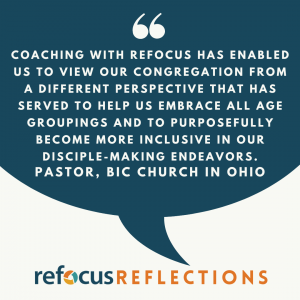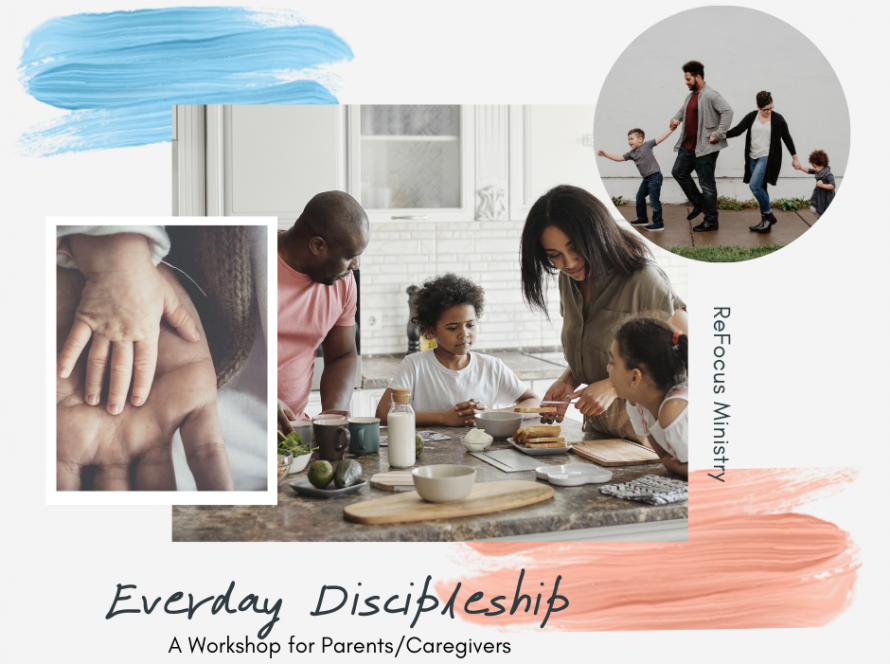“You just can’t include kids in everything. Some things aren’t even appropriate for kids!”
“There’s a lot of activity and movement. I’m not sure the older folks will really be able to participate in that.”
“Unfortunately, the only time we can hold this event in the evenings and that just doesn’t always work for young families.”
These sentiments and others like them are what often get shared when a church or community begins to think about the logistics of intergenerational ministry. There’s an immediate assumption that if every generation in the church isn’t represented, then it doesn’t meet intergenerational muster.
By and large, western Protestant churches fall into age-segregated rhythms. The curriculum, programming, and even the design of the building tend towards keeping people in fairly homogeneous groups with others who look like them, have the same life experiences as them, and are roughly the same age as them.

In my opinion, any opportunity we have to broaden the scope of who we are interacting with and building relationships with in our faith community is a step in the right direction. To help churches who have succumbed to the all-or-nothing approach into integrating ages, I often use the “Rule of Three.”
Simply put, the Rule of Three ensures that at least three generations are present in any given situation. The Rule of Three is a lens that we can apply to our community activities to ensure we are expanding our reach and opportunity for connection, relationship, and discipleship beyond our regular age limitations.
Why three? Well, quite simply, the presence of three generations fulfills an important factor in intergenerational community. When three generations are present, the opportunity for passing on faith and learning from one another exists in a way that doesn’t when only one generation is present. With three generations, you have three perspectives; one representing the Past, one representing the Present, and one representing the Future.
But that doesn’t include everyone! How can that be intergenerational?
One of the biggest missteps we take in intergenerational ministry is the all-or-nothing approach to everything – either every age is present all of the time or we are siloed and segregated all of the time. But in reality, we need both – developmentally and physically, different ages have different needs. However, at the same time, we need each other in order to be developmentally and physically healthy.
Being intentionally intergenerational recognizes these needs and strives to create an environment where multiple opportunities for learning, growing, and worshiping together exists. It is not a cookie cutter approach. There’s no “one way” to do it.
The Rule of Three allows a broad spectrum of intergenerational ministry to take place across the church – times where all generations are present like Sunday worship or church service projects and times where only three generations are present like marriage and family classes, weekday daytime Bible studies or brunches, book studies for retired individuals, and children’s/youth mission trips or weekend retreats.
How does this work?
It’s actually more simple than you might realize. All you have to do is simply ask, “Is this event/program/activity accessible to at least three generations?” And if it is, follow up with “How can we intentionally welcome at least three generations in?”
If a church can shape an environment where there is a multi-faceted landscape of intergenerational offerings, where there are activities for everyone to gather and activities for at least three generations to connect, that community has a much better chance of fostering relationships across generations and creating opportunities for generational discipleship and mentoring.
Let’s be honest: The Rule of Three is less a rule than it is a guide. It’s one helpful way for us to consider how we can be inclusive of all generations as we design spaces and places for spiritual formation. And if we keep in mind always that our goal is to help generations connect in order to build relationships that lead to discipleship, this is one way to ensure that first step of connection can happen. It’s a tiny shift, but a big one in how we grow our community.
How Can ReFocus Help?

Transitioning to a more generationally inclusive format within your church can be challenging. ReFocus Ministry offers several resources to journey with your church and leaders as they move towards connecting generations, supporting family ministry, and creating multi-generational worship and learning experiences.
REFOCUS COACHING & CONSULTING – Your ReFocus coaching experience begins with a FREE 30-Minute Initial Coaching Call and ends with a congregation connected to one another and their community like never before. Together, you and/or your team will discover the generations in your church, identify the bridges and barriers to intergenerational interaction, and create an action plan to grow your community.
These services and more can be found on our website. To sign up for your FREE initial consult, fill out this form and we will be in touch.
You do not have to do this alone. We are here to support, encourage, and equip you for the work of generational discipleship in your church. Contact us today!
About the Author

Christina Embree is the founder and director of ReFocus Ministry. She holds a masters in ministry focused on Children, Youth, and Family Ministry and is completing her doctoral degree in spiritual formation with a focus on age segregation and intergenerational ministry. In addition to coaching churches of multiple denominations and traditions all around the globe, Christina serves as the Minister of Generational Discipleship for the Great Lakes Conference of the Brethren in Christ and as a pastor at Plowshares Brethren in Christ in Lexington, Kentucky. She is widely recognized as a speaker and author in the areas of generational discipleship, intergenerational ministry, and family ministry. As the mother of three children, she is familiar with the challenges of faith at home and pastoral ministry. She along with her husband Luke share a love for the church, their community, and the global work of peace and restoration through Jesus.

